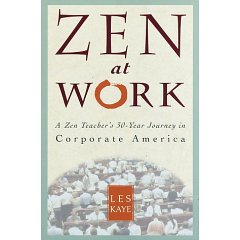The Empty Inbox Zendo

The PCCC book club's choice for March was Zen Mind, Beginner's Mind by Shunryu Suzuki. There wasn't a great turnout for the discussion last week. I think the nature of the book scared people (back to fiction next month). I was discussing Zen practice with one of my colleagues after the session and I said I would look up a few titles that had come up in our conversation.
The idea was Zen at work, and I remembered that I had 2 books at home about that.
It probably sounds funny to think of us at work/school in the lotus position meditating while the computers and copy machines and students and co-workers whirl around us. And, of course, that's not what I would suggest.
 One of the books is Zen At Work: A Zen Teacher's 30-Year Journey in Corporate America by Les Kaye.
One of the books is Zen At Work: A Zen Teacher's 30-Year Journey in Corporate America by Les Kaye.This book is more about showing that practicing Zen at work can be done and in fact is an important aspect of Zen practice. When Kaye retired from a job as a design engineer at IBM (1956-88), he had already been a practicing Zen monk. The book mixes stories about his Zen attitude at IBM and in monasteries. A big part of the book looks at relationships at work.
Kaye studied under Suzuki in the 1960's in California, so there's a definite Zen Mind, Beginner's Mind connection. Both books emphasize practicing Zen in everyday situations like sitting at a desk or walking.I'm not making a suggestion for religion or Zen to enter your classroom or office exactly, but the focus on the present moment, and the discipline that can bring such calming benefits doesn't seem out of place.
Which brings us to "empty mind." In the seated meditation called zazen, you try to empty the mind of distractions. This is related to an "open mind" and the "beginner's mind" from the title of Suzuki's book.
Rather than thinking of it as being empty headed and foolish, think of this concept as being open to new things in the way that a beginner is open to suggestions and new ideas and approaches.
If your mind is empty, it is always ready for anything; it is open to everything. In the beginner's mind there are many possibilities; in the expert's mind there are few. ~ Suzuki
Kaye argues that the traits that are encouraged in the corporate culture were not that different from his Zen study: integrity, morality, self-discipline, willingness to learn, responsibility and perseverance. Kaye became the abbot of the Kannon Do Zen Meditation Center in Mountain View, California.
Last Friday, I went through all my school email and deleted, answered or archived everything in the inbox. Empty inbox. It felt very good.My good friend and fellow English teacher, Leon, belongs to the Empty Bowl Zendo here in NJ. Empty bowl, empty mind - my empty inbox school of Zen. Clearing away he clutter, so that you can focus. We all know the pleasure of the clean desk, new notebook, fresh start... and the clocks have changed, so spring must be coming.
 The second book I pulled off the shelf is closer to our educational workplace. Zen and the Practice of Teaching English by Robert Tremmel.
The second book I pulled off the shelf is closer to our educational workplace. Zen and the Practice of Teaching English by Robert Tremmel.
According to the book jacket, he teaches methods courses, supervises student teachers, and coordinates the teacher education program in the English department at Iowa State University. Like the Kaye book, it's a personal journey. Tremmel is suggesting, as Kaye did for the corporate world, that the foundations of teaching practice are much the same as the foundations of Zen, and that our lives in and out of the classroom should be seen as one life. Spiritual practice, teaching practice and the practices of living.
Though he may have preservice teachers in mind for this book, I could see a retreat for the rest of us to examine why we decided to teach, how we renew our discipline and abilities.
"My purpose in writing this book is not to add to what I see as an already more than healthy and growing supply of scholarship about teaching.
Instead, I want to focus on what I finally found in my own teaching practice that helped me start making sense of the confusion that was my own, but that I know is felt also by others who have teaching in their blood."

My Net researching for this post also led me to the Empty Bowls Project. It's not a Zen project at all, but I like what I found there. Participants create ceramic bowls and use them to serve a simple meal of soup and bread. Guests choose a bowl to use that they will keep as a reminder that there are always empty bowls in the world. In exchange for the meal and the bowl, the guest gives a donation that will go to a hunger-fighting organization. The organization can be in their own community or one for national/international hunger relief. The site archives examples of groups that participate. Sounds like a great Art With Purpose project for a school.
Comments
No comments